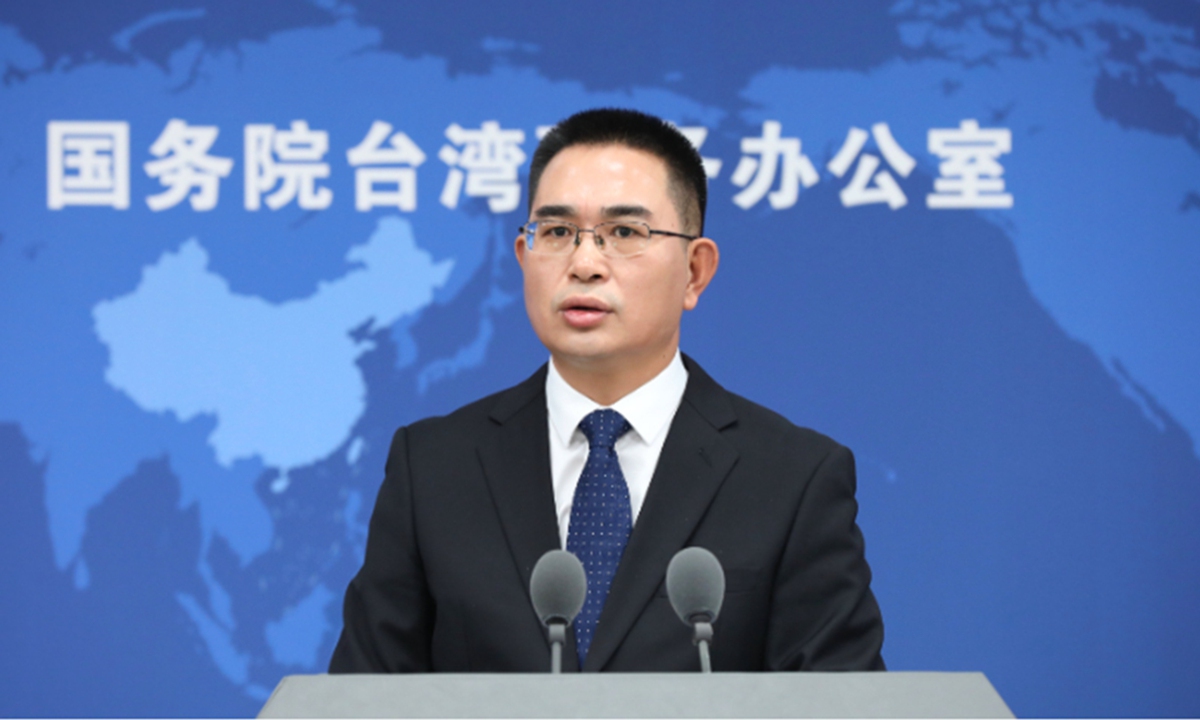
Chen Binhua, a spokesperson for the State Council's Taiwan Affairs Office Photo:VCG
Statements from Taiwan's "mainland affairs council" once again reveal the Democratic Progressive Party (DPP) authorities' stubborn adherence to "Taiwan independence" separatism and their continuous provocations and confrontations, said the State Council Taiwan Affairs Office on Tuesday in response to remarks from the deputy head of the council concerning the regional leader's repeated assertions of "mutual non-subordination" between the two sides of the Taiwan Straits since taking office.
After taking office on May 20, Taiwan regional leader Lai Ching-te has repeatedly mentioned "mutual non-subordination," stirring strong dissatisfaction from the mainland.
In an interview on July 1, Liang Wen-chieh, deputy minister and spokesperson of the "mainland affairs council" in Taiwan, stated that in other legal systems apart from the "Constitution," "we treat the other side as a country in all our actions."
In response to that, Chen Binhua, a spokesperson for the State Council Taiwan Affairs Office, told a press conference on Tuesday that the historical context of the Taiwan question is clear, and the legal fact that Taiwan is a part of China is undeniable.
According to Chen, although the two sides of the Taiwan Straits have not yet fully unified, the sovereignty and territory of China have never been divided and will never be divided, and Taiwan's status as part of China's territory has never changed and will never be allowed to change.
Since taking office, the Lai Ching-te authorities have disregarded facts, distorted legal principles, and blatantly promoted the two-state theory, causing strong dissatisfaction and firm opposition among compatriots on both sides of the Straits, Chen said.
The Taiwan compatriots are aware of the situation. Lai's "Taiwan independence" rhetoric cannot deceive the public on the Taiwan island or whitewash his nature as a "Taiwan independence advocate" and "troublemaker." Any actions that challenge the one-China principle and provoke compatriots on both sides of the Straits will be punished and are destined to fail, Chen added.
In regards with DPP authorities' remarks made about "mutual non-subordination" across the Straits and that the mainland has no "judicial jurisdiction" over the island when the DPP authorities referred to the mainland's guidelines recently rolled out on punishing "Taiwan independence" separatist forces, Chen responded on Tuesday that the actions of the DPP authorities completely disregard facts, distort right and wrong, maliciously smear and defame the mainland, and blatantly threaten and intimidate the people in Taiwan.
Punishing stubborn "Taiwan independence" separatist forces for crimes of splitting the country and inciting separatism is reasonable and lawful. The Taiwan island is a part of China, and China will never allow "Taiwan independence" separatist forces to separate the island from China under any name or by any means, Chen said.
Only by strictly punishing "Taiwan independence" separatist crimes in accordance with laws can we truly uphold peace and stability across the Straits and effectively safeguard the interests and well-being of the Taiwan compatriots, Chen noted.
Any stubborn "Taiwan independence" separatist forces who challenge the law, regardless of where they are, will be pursued to the end by the national law enforcement and judicial authorities, and be punished according to laws, Chen said.
Global Times




